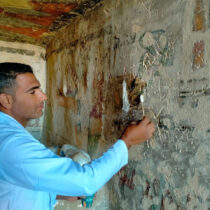While the return of Mohammed Ibrahim in his position as Minister of State for Antiquities in Egypt still raises complaints by archaeologists in the country, the reappointed official is already mapping plans of continuing what he had started first time around.
Mohammed Ibrahim first took the post in the National Rescue Government led by Kamal El-Ganzouri and continued to fill the position in Hisham Qandil’s government. However, in the Cabinet reshuffle on 7 May, Ibrahim was replaced by Ahmed Eissa, dean of the Faculty of Archaeology, South Valley University. Last Tuesday he was reappointed as Antiquities Minister by the interim government headed by caretaker prime minister Hazem El-Beblawi, after Raafat El-Nabarawi, former dean of the Faculty of Archaeology at Cairo University, declined the offer.
Now, from the Ministry’s headquarters in Zamalek, Cairo, he plans to expedite construction, development and restoration work that was put on hold over the last year in an attempt to attract more tourists to Egypt. Ongoing activities include inaugurating new sites (e.g. the Avenue of the Sphinxes in Luxor and the Hanging Church in Old Cairo) and resuming the Egyptian Museum’s development project started in his previous tenure. Dr. Ibrahim also plans to solve the problem of appointing fresh graduate archaeologists in the Ministry, by finding a legal way to surpass a 2012 law prohibiting new appointments to any sections in the government. For the time being, he embarked on a number of field tours, including the Egyptian Museum in Tahrir, the Salaheddin Citadel and the Matariya archaeological site, in order to inspect their current status and assess the requirements of sprucing up restoration works being carried out, as wel as tightening security measures.
Meanwhile, a considerable number of archaeologists and employees of the MSA reject Ibrahim’s reappointment and have announced plans to stage protests in front of the ministry.
The independent syndicate of MSA employees give the Cabinet a list of demands, on top of which are sacking Ibrahim and putting into action Law 116 of 2012 that stipulates the appointment of fresh graduate archaeologists and temporary MSA employees as well as the establishment of a committee to probe financial corruption among contractor companies that have worked in restoration projects at archaeological sites.
Omar El-Hadari, head of the independent syndicate of MSA employees, said that archaeologists will sign a “Rebel Petition” calling for the sacking of Ibrahim if the Cabinet does not remove him within a week.
El-Hadari continued that according to the plan, if the Cabinet does not meet the archaeologists’ demands, the signed petitions would be handed over to Interim President Adly Mansour in September.




